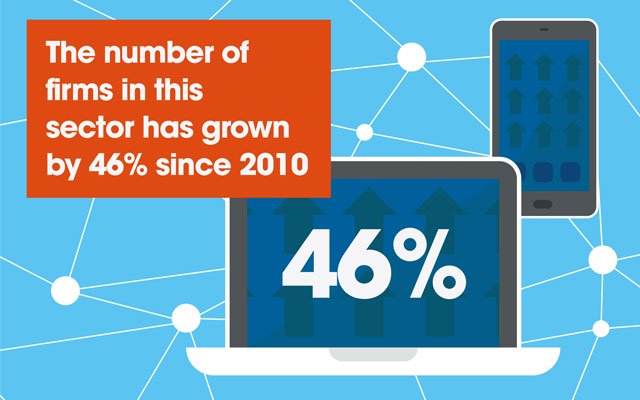If you have any questions about your Business Insurance, speak to the Swinton Business team today.
Information & communication, and professional, scientific & technical activities
This is a growing and increasingly diverse sector. In addition to IT, the information and communication sector includes publishing, programming, broadcasting and telecommunications.
Additionally, the professional, scientific and technical activities sector includes law, accountancy, engineering, scientific research and development, advertising and market research businesses.
Key insights
The number of firms in this sector has grown by 46% since 2010.
IT companies are experiencing exceptionally strong growth as organisations look to ensure their operations meet the demands of the modern digital world.

Similarly, businesses falling under the professional, scientific and technical activities sector are, generally speaking, seeing success, if for different reasons.
According to the Office for National Statistics, the professional, scientific and technical activities industry is a “microcosm of London’s overall economy”.
The economic success of this sector mirrors that of the city itself with the growth in jobs in this sector leading London’s overall job growth.
While the legal sector, in particular, might have contracted during the recession, all the indications are that it’s currently prospering once again after recording growth of 8% between 2014 and 2015.
But it’s those professions with digital skills at their heart that appear to be doing best of all. According to a report published by the British Government in 2017, digital sectors contributed £118bn to the economy in 2015, representing more than 7% of Britain’s gross value added (GVA).
Looking at the various regions of the UK, the East Midlands has seen increasing strengths in the financial and professional services, administrative businesses, as well as life sciences. Plus, the city of Leicester has seen an 86% rise in information and communication businesses, with the total number growing from 425 to 790 – this includes a new call centre for high street clothing retailer Boden.
In Greater London, information and communication businesses grew by 71%, from 40,655 to 69,400, including computing companies such as 'learn to code' start-up Kano. Alongside this, professional, scientific and technical businesses rose from 76,515 to 123,420, which is a growth of 61%. Employment in this sector is highly concentrated in central London, thanks to the large number of company head offices, consultancies and more.
In Greater London, information and communication businesses grew by 71%, from 40,655 to 69,400
In the East London borough of Newham, there was even greater success in the professional, scientific and technical fields: Businesses here increased from 640 to 2,165 – that's a huge growth of 238%! Much of this can be attributed to the £1.7 billion ABP Royal Albert Dock business district, which is currently being developed.
Moving over to the West Midlands, Coventry has seen an impressive 85% rise in the professional, scientific and technical industries, which is partly due to the number of firms setting up their head offices in the city, including UK Mail.
Up north, the number of businesses in Hartlepool in the North East has grown by 24% overall, driven by a surge in professional, scientific and technical firms, which have increased by 105%. This large growth is partly due to the town's £3.4 million Church Street regeneration project, where engineers and contractors are working to transform the area into a creative hub for local businesses.
Across the sea in Northern Ireland, there has been a 36% increase in information and communication businesses – in Belfast specifically, this increase was even greater, at 52%, due to companies such as England-based business telecoms provider Onecom
setting up shop in the city. Meanwhile, the district of Newry, Mourne and Down has seen professional, scientific and technical businesses grow by 34%, from 410 to 550, which is partly thanks to the development of start-ups in the area via The Regional
Start Initiative.
What does the future hold?
In the year to March 2017, visa applications from people outside the European Union wanting to come to work in the UK's professional, scientific and technical activities industry saw the biggest fall of any sector. The industry may need to look at a way to address this slowing in the supply of skilled workers in the years to come if it is to continue to progress at the same rate.
For further information on the sourced references for the Business Trends data, outside of the Business Population Estimates 2017 and Nomis official labour market statistics 2010 and 2017, please download the information here (PDF, 233MB)